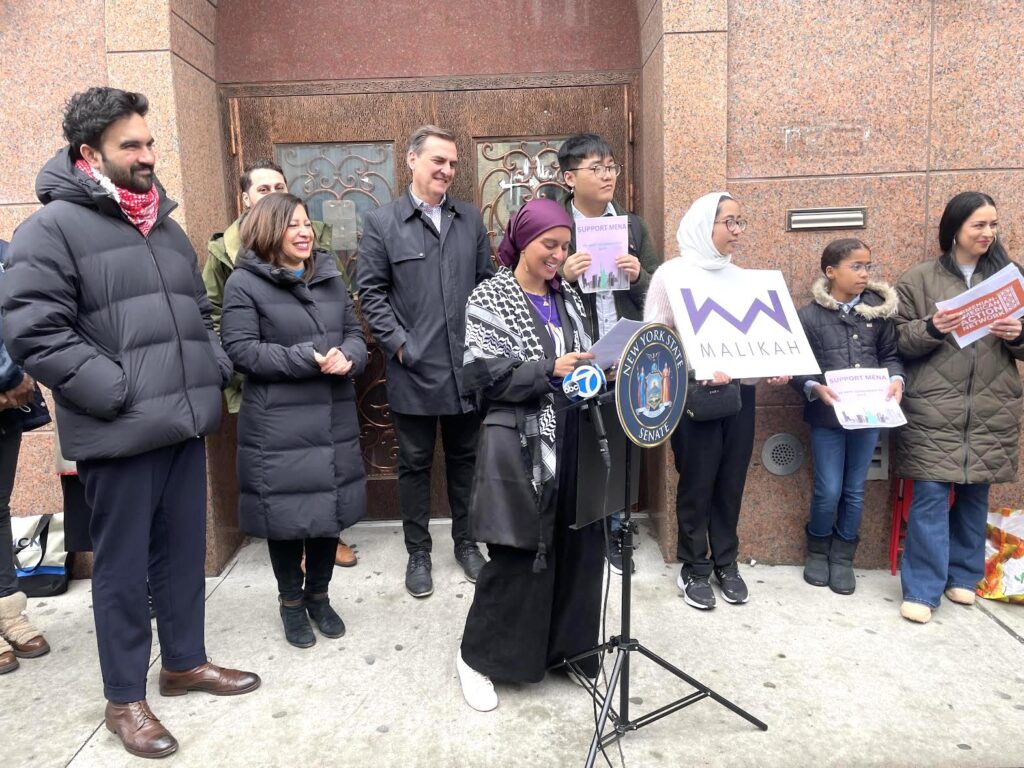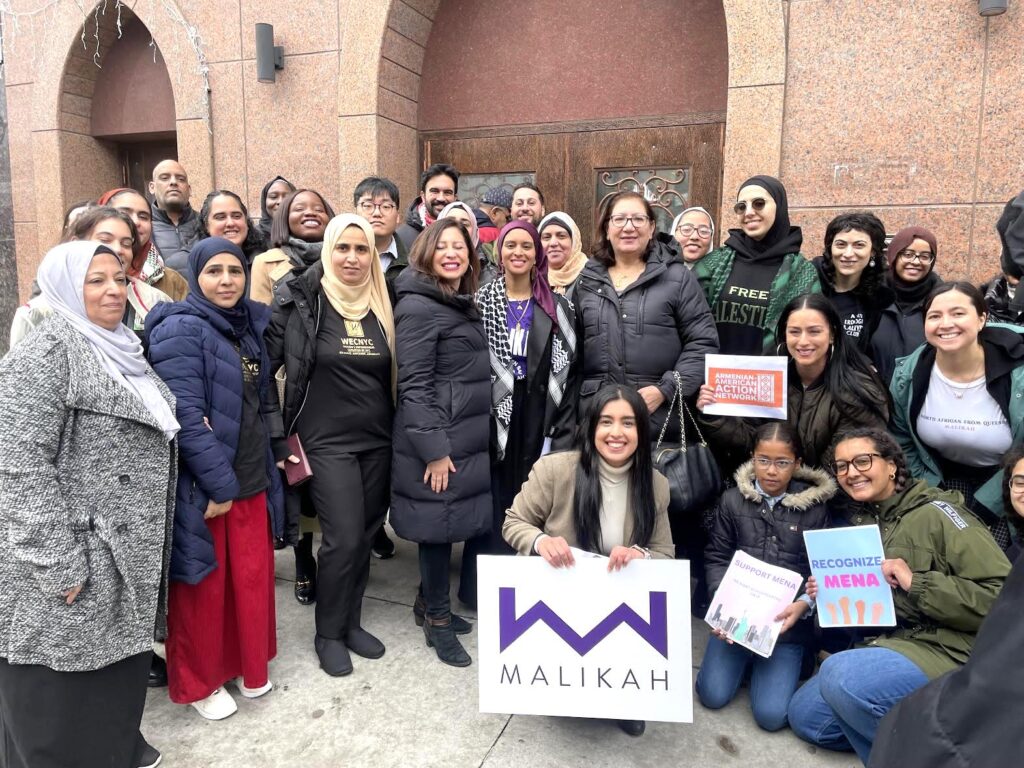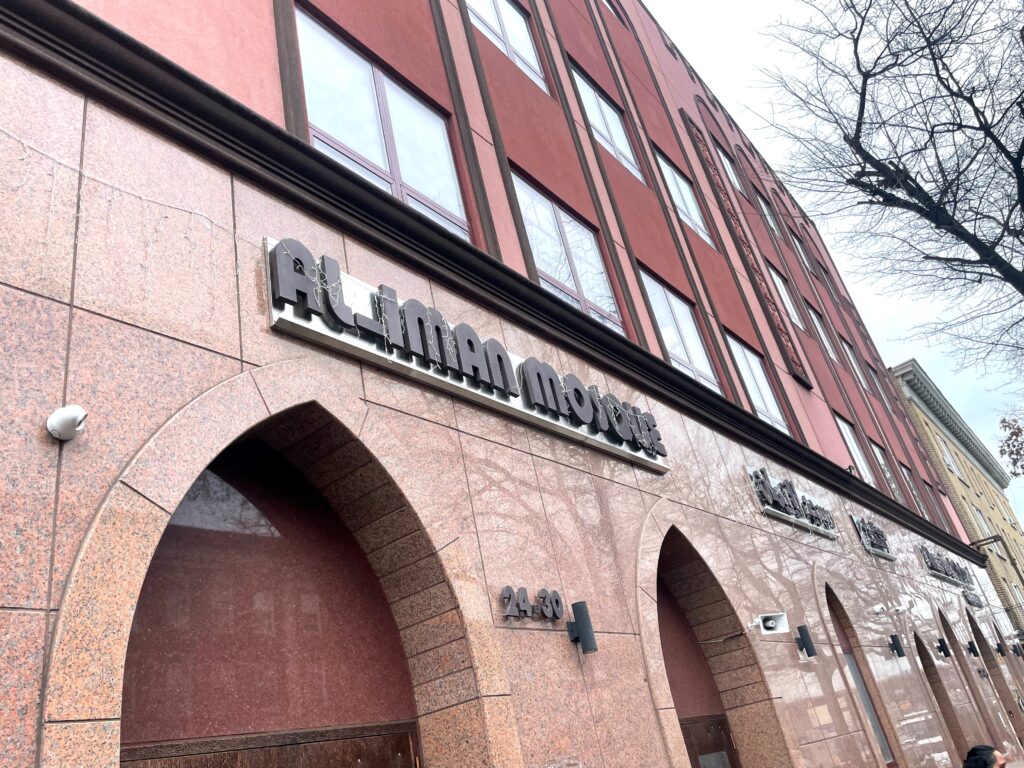By MOHAMED FARGHALY | mfarghaly@queensledger.com

Credit: Mohamed Farghaly. Rana Abdelhamid of Malikah delivers a powerful address, emphasizing the importance of accurate representation and access to resources for the Middle Eastern and North African community during the rally.
A diverse coalition of legislators and advocates gathered at the Al-Iman Mosque in Astoria on April 1 to rally in support of passing crucial legislation aimed at recognizing Middle Eastern and North African (MENA) individuals in New York State’s demographic data.
The MENA bill Seeks to rectify a long standing issue where MENA communities have been incorrectly categorized as white in government documents. This misclassification has led to inadequate representation and resource allocation for these communities.
The conference, led by Rana Abdelhamid of Malikah and the NY MENA Coalition, commenced with motivating remarks from the representative of the Middle Eastern and North African community.
“For decades, our community has been completely erased, we have not been seen in data and that has had dire devastating consequences for health care outcomes, for education outcomes in the community and for access to language translation in this community,” Abdelhamid said. “For so long, we have been designated as white as our designation and our community has been completely erased. Honestly, it’s offensive and it is not accurate. We need representatives that advocate for us, we need support across the board and in order for us to be able to have that kind of support, we need data that actually reflect and tell some story about what our team is.”

Credit: Mohamed Farghaly. Community leaders gather outside Al-Iman Mosque in Astoria, Queens, to advocate for the recognition of Middle Eastern and North African individuals in New York State’s demographic data.
Senator Michael Gianaris was one of the first legislators to speak on the topic in support of the bill.
“Let’s begin with a very simple proposition, Middle Easterners and North Africans are not white. That’s something we should all be able to agree on,” Gianaris said. “And yet, New York State and even the federal government recognize them as white. That means a couple of things. First of all, it’s offensive, because you’re telling an entire community that they are not what they think they are. And they know best. But it also means that the government doesn’t see that community. The state doesn’t know where they are, what their needs are. And that means that the real consequences in terms of government services and communities are underserved because of it, and often aren’t able to avail themselves of like government programs and services that are specific to certain communities. And so, we are aiming to change that.”
According to the U.S. Census, there are at least 280,000 MENA individuals residing in New York State, though studies suggest the actual number could exceed 500,000. The MENA Bill aims to disaggregate MENA populations from the white demographic category or collect separate data on each major MENA group.
Assembly Member Jessica González-Rojas emphasized the importance of this legislation, stating, “Viscerally that middle eastern North African communities have not been treated as white have not benefited from white privilege. I continue to face many harms that many other communities of color face. And it’s critical that we have the data and the information to uplift this reality.”
Assembly Member Zohran Mamdani then took to the podium to share his sentiments as a member of the community he is trying to represent. “It baffles the mind that when the NYPD created demographics and units under the leadership of Mayor Mike Bloomberg, they understood that North Africans and Middle Easterners are not white. But when it comes to any aspect of state support, when it comes to any aspect of recording statistics that tell the stories of this community, this entire community has been absorbed into the idea of whiteness. We have to turn a new page and ensure that now we see state support for this community. Because if you’re not recorded in these statistics, your story is not told. And if your story is not told, then your life is not supported.”
The rally garnered significant support from a diverse array of community leaders, each representing various organizations dedicated to advocacy and empowerment. These leaders brought with them a wealth of experience and expertise from their respective fields, highlighting the widespread coalition formed in support of the MENA Bill.
Somia Elrowmeim of the Women’s Empowerment Coalition shared her sentiments. “I always have asked myself why I have to choose white, I’m not white and I do not have the privilege of being white and that would really bother me. Allah. We have been advocating and educating our community because we want to be recognized. And we want to get the support that we need as people of color as Middle Eastern or North Africas, that’s important to us, because we always have been underserved.”
Youssef Mubarez, representing YAMA Action, emphasized the importance of passing the MENA Bill. He highlighted the challenges faced by Middle Eastern owned small businesses in New York, which were initially considered essential workers during the COVID-19 pandemic but have since been overlooked.
“We were the first to give support, but the last to get support, all because of the simple checkbox that says that we are white, and our families are white,” Mubarez said. “Passing this bill means that when we apply for business loans and grants that are supposed to support minority communities on a level playing field, we urge state legislators to pass this bill, so that we are no longer essentially forgotten.”
The MENA coalition sought guidance from the Asian American community and collaborated with the Coalition for Asian American Children and Families (CACF) to advance their cause. Recognizing CACF’s successful advocacy efforts in the past, which led to tangible results for their own community, MENA reached out for advice and support.
Jeemin Cha, representing CACF, expressed solidarity with the MENA New York Coalition and emphasized the importance of passing the data disaggregation bill.
“CCAF stands with the MENA New York Coalition to urge New York state legislators to pass the needed data disaggregation bill. The MENA community has been made invisible by being lumped into the White category, obscuring their unique struggles in health, education, housing and political representation. This injustice ends now. Passing this bill marks a historic step towards the true representation they deserve in New York.”
With broad bipartisan support and a unified coalition of advocates, the MENA Bill represents a crucial step towards rectifying long standing disparities in data representation and ensuring equitable access to resources for MENA communities across New York State.
“The MENA community has been invisible for too long,” stated Abdelhamid. “This legislation is a crucial step towards proper representation and access to resources.”

Credit: Mohamed Farghaly. Gathered outside the culturally significant Al-Iman Mosque in Astoria during the holy month of Ramadan, a diverse coalition of legislators and advocates rallied in support of the MENA bill.





